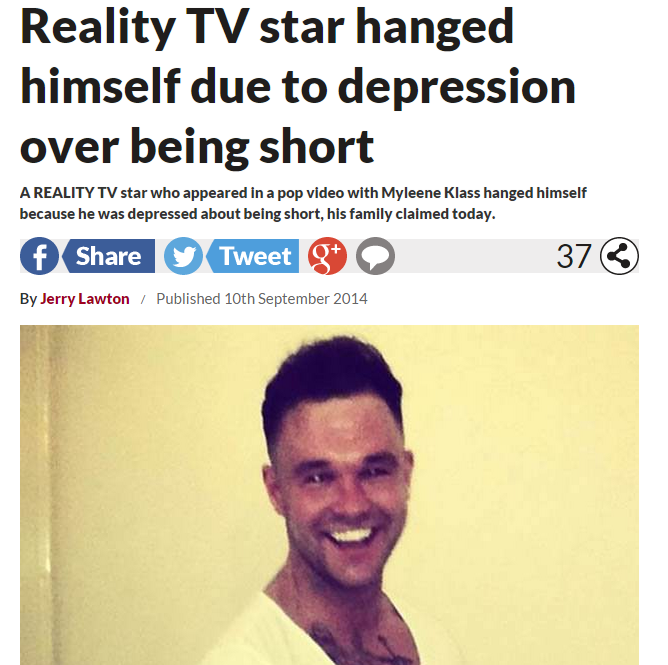Height Shaming In Media: DirecTV
"Petite Randy Moss" campaign falls flat.
Published August 2015
With all of the social justice firestorms caused by media attempts at body shaming in the last decade or so, it is surprising then that DirecTV, a company with 20.4 Million subscribers in the United States, and whose revenue grew 6% to $8.4 Billion in the first quarter of this year, green-lighted an advertisement which openly mocks short men as being infantile, abortive, socially inept and economically disadvantaged. The nationally syndicated commercial opens with two versions of NFL Hall-Of-Fame hopeful Randy Moss.
See Also: How To Handle Workplace Microagressions As A Shorter Man
The football player is paired with a diminutive version of himself referred to as “Petite Randy Moss”. The “real Randy Moss” is a confident DirecTV subscriber who lives lavishly in an upscale condominium with sleek mode furnishings, a giant mounted flat screen and is dressed dapperly, while the petite version lives in a crummy apartment with a 1980s styled CRT, sports tattered clothing and laments at having regular cable.
DirecTV Petite Randy Moss Commercial | Source: YouTube
To further differentiate the lives of the two, they show the disappointed petite version in a supermarket aisle wearing wrinkled clothing hopelessly hopping to reach a cereal box on the top shelf called “Fruity Munch”. Upon closer inspection, you’ll notice that the shelf closest to him has a cereal named “Giraffe Crunch”, while the shelf just above his reach contains another titled, “Honey Heroics”. The advertisement closes with a smiling real Randy Moss, who stands at about 6’4 saying “Don’t be this me” while pointing at the short despondent version of himself.
So why should anyone be outraged? Well, let’s try an experiment by slightly changing the characters. What would the response be if a similar commercial featured a sharply dressed Caucasian Randy Moss living it up in the suburbs paired against a Black version in ragged clothes struggling to make it day to day in the inner city? How about a thin blonde Rhonda Moss running down the boardwalk in a tight bikini versus an overweight version in sweats having trouble fitting through the door of a GNC? We all know the answer. There would be a backlash so enormous internet bandwidth everywhere would be compromised. You’d have all of the media outlets covering the affair at length with social justice warriors expressing their opinions and criticism at every opportunity and in every medium available. Knowing this begs the question, “Where are the social justice warriors now”?
Media Outlets Are Quick To Reprimand Body Shamers, But Not When It Involves Males. | Source: CBS
The answer is probably “relaxing and enjoying a long hearty laugh”. No one cares when body shaming campaigns affect men. Short men in particular are one of the few remaining groups in which open mocking or short-shaming, no matter how vitriolic it may be, is considered socially acceptable and politically correct (i.e. suck it up shorties). On the other hand, making fun of someone’s weight, skin color, gender, ethnicity, etc. can lead to social and professional suicide. Criticize this status quo and you will be further mocked, framed as bitter and unable to take a joke. This being the case, DirecTV, whose successful string of “Don’t Be Like X” commercials initially focused on odd personalities representing their mediocre competitors, decided to put their foot in physicality arena; insulting the people they knew would generate the least amount of backlash – a cowardly move.
See Also: Why Short Men Will Never Get Any Empathy
Assuming that “petite” is 5’9 or less (which considered is short for a man socially and very short by NFL standards), why then would DirecTV take a chance at insulting 3.57 Million of its subscribers with a blatantly offensive heightist ad? Heightism is a real thing and goes way beyond trivial short jokes. Short men get paid less, promoted less and are sought after romantically far less than their taller counterparts all because of this ignorant belief that shorter people are somehow less capable. Last year Reality TV Star Coroner Louise Hunt hung himself after years of depression over his height. Thirteen year old Jonathan Short-Scaff of Ohio committed suicide after years of being tormented about his short stature. In 2012, twelve year old Joel Morales was found dead in his bathroom, hanging himself with a belt after being bullied in multiple schools over his short stature. Think of all the millions of young Jon Stewarts, Josh Hutchersons and Kendrick Lamars out there who have no chance at what society considers “winning the genetic lottery”, developing the understanding of what society has in store for them when they come of age through the messages that they are constantly bombarded with through these types of advertisements. DirecTV had a responsibility here and failed miserably by green-lighting this project.

Reality TV Star John McNally committed suicide over height shaming | Source: Daily Star
Advertise With Short Kingz And Reach 100,000+ Per Month!
This isn’t about being able to take a joke, but equating short stature with inferiority. Most companies in this day and age wouldn’t do this with any other group. Outside of a few YouTube comments and bit of an uproar by a few short men on the site Reddit regarding this ad, we wonder where all of the social justice warriors and commentators from major media outlets are who would jump at the chance to shame advertisers and popular personalities for as much as directing a simple joke at other groups. Here we have a body-shaming advertisement shown from coast to coast and probably internationally from an $8.4 Billion company and all we hear are crickets. Shame on you DirecTV, shame on you.
Like This Article? Chat About It And More On Our Forum For Short Men!



 Home
Home Blog
Blog Fashion
Fashion Community
Community Galleries
Galleries SHOP
SHOP About
About Advertise
Advertise






 Discuss anything in our forums!
Discuss anything in our forums!
.png)

[0 Comment]